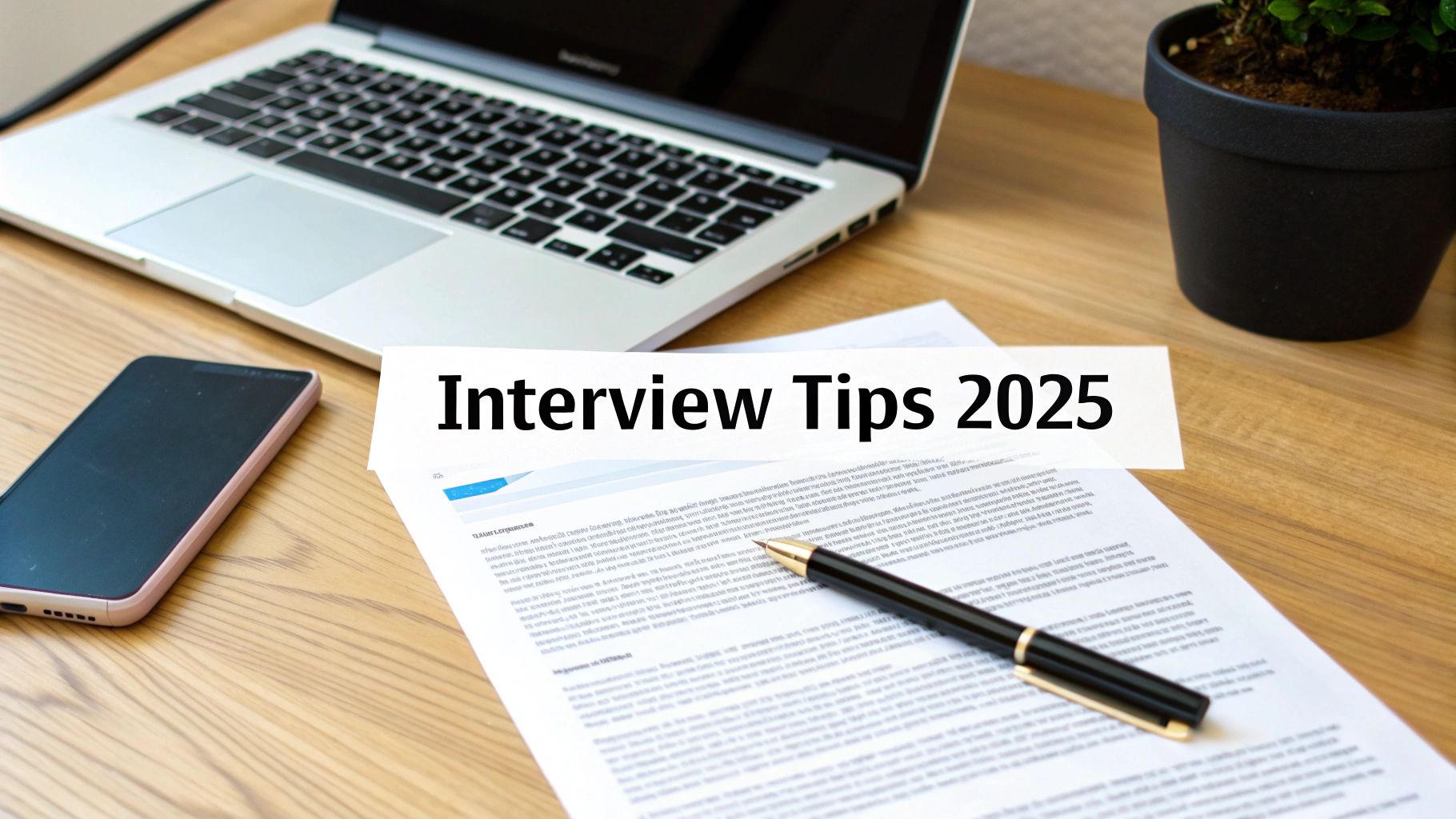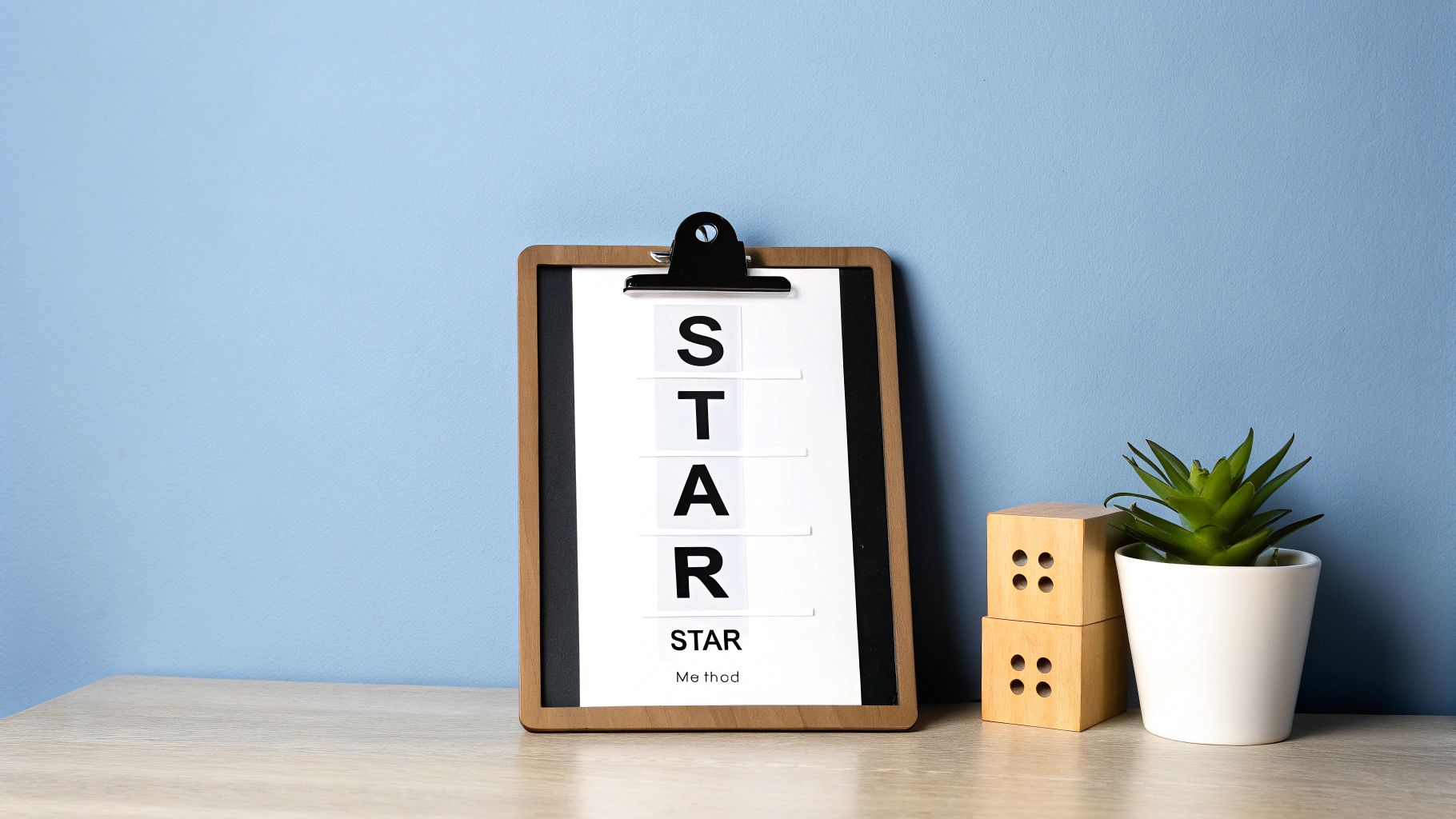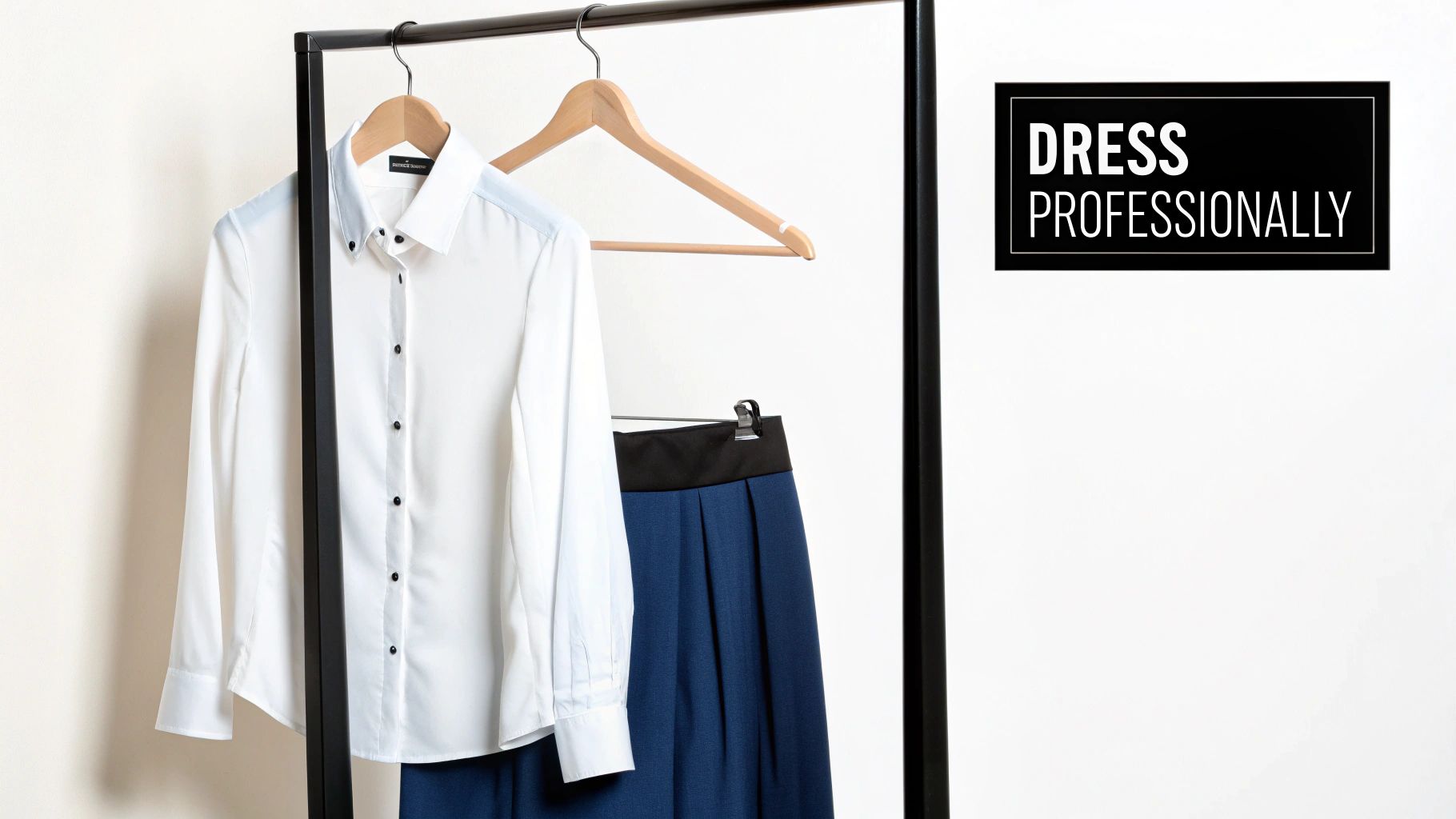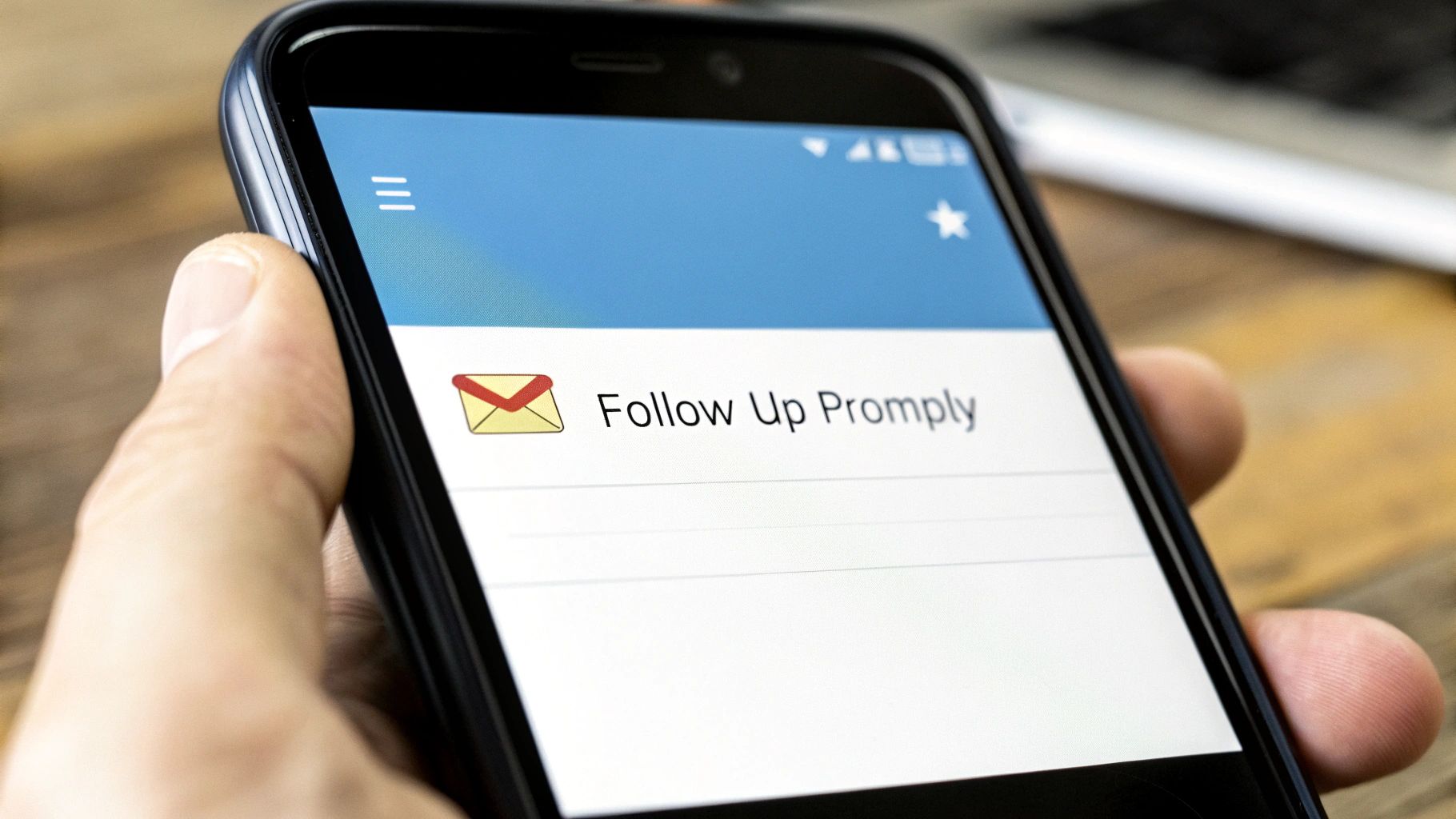7 Essential Job Interview Tips for Success in 2025

The job market is more competitive than ever, and a successful interview is often the final gatekeeper to your dream role. It’s not just about what you know, but how effectively you can communicate your value, experience, and potential. This guide moves beyond generic advice to provide a strategic playbook of actionable job interview tips for success, designed to transform your approach from hopeful to hired. We will equip you with the tools to confidently articulate your skills and leave a lasting, positive impression.
This comprehensive listicle breaks down the essential pillars of interview mastery. We’ll cover everything from conducting deep company research and mastering the STAR method for behavioral questions to preparing compelling questions that demonstrate your engagement and intellect. You will learn how to practice effectively, showcase genuine cultural fit, and execute a flawless follow-up strategy. Each tip is structured to provide clear, practical steps you can implement immediately to gain a competitive edge.
Navigating the interview process requires a holistic strategy, covering every stage from initial preparation to the final handshake. For a comprehensive overview that covers all aspects of the interview journey, consider exploring a complete success guide to preparing for an interview. Whether you're a recent graduate or a seasoned professional, these insights will help you navigate the process with precision and secure the offer you deserve. Let's begin.
1. Research the Company and Role Thoroughly
Walking into an interview without in-depth knowledge of the company and role is like navigating a new city without a map. Thorough research is the foundational step for any successful job interview, transforming you from a generic applicant into a candidate who demonstrates genuine, specific interest. This preparation allows you to tailor your answers, ask insightful questions, and show the interviewer you are serious about this specific opportunity, not just any job.

True preparation goes far beyond a quick glance at the company’s homepage. It involves a multi-pronged approach to understand the organization’s DNA, its current market position, and the exact challenges the role is meant to solve. This deep dive is one of the most critical job interview tips for success because it directly impacts your ability to connect with the interviewer and articulate your value.
Why It's a Game-Changer
Comprehensive research provides several strategic advantages. Firstly, it enables you to align your personal story with the company's narrative. When you can connect your skills to a recent project the company launched or your personal values to their stated mission, you create a powerful, memorable connection. Secondly, it equips you to ask intelligent, specific questions that demonstrate your engagement and critical thinking, setting you apart from less-prepared candidates.
Actionable Research Strategy
To conduct effective research, focus on these key areas:
- Dive into the Job Description: Scrutinize the job description for keywords related to skills, responsibilities, and qualifications. Prepare specific examples from your past experience that directly address each key requirement.
- Explore the Company's Digital Footprint: Systematically review the company's website (especially the "About Us," "Mission," and "Press/News" sections), their LinkedIn page for recent updates and employee profiles, and platforms like Glassdoor for insights into company culture.
- Stay Current on Company News: Search for recent news articles, press releases, or financial reports. Mentioning a recent product launch, a new market expansion, or a positive quarterly report shows you are actively following their journey. For example, you could say, "I saw that you recently launched Project X to address the European market. My experience in international logistics could be valuable in supporting that expansion."
- Research Your Interviewers: Look up your interviewers on LinkedIn. Understanding their background, tenure at the company, and professional interests can help you build rapport and tailor your conversation to their expertise.
2. Master the STAR Method for Behavioral Questions
Behavioral questions like "Tell me about a time when..." are designed to gauge your past performance as an indicator of future success. The STAR method provides a structured framework to answer these questions with compelling, evidence-based stories. This technique transforms vague responses into clear, concise narratives that showcase your skills, problem-solving abilities, and accomplishments in a way that resonates with interviewers.

The STAR method stands for Situation, Task, Action, and Result. By following this sequence, you ensure your answer is logical, easy to follow, and directly addresses the core competencies the interviewer is assessing. Adopting this technique is one of the most powerful job interview tips for success because it prevents rambling and forces you to focus on the impact of your actions, a key element that separates strong candidates from weak ones.
Why It's a Game-Changer
Using the STAR method provides a clear advantage in high-stakes interviews. It demonstrates your ability to communicate effectively and think logically under pressure. Instead of simply claiming you have a skill like "leadership" or "problem-solving," you provide concrete proof through a real-world example, making your qualifications more tangible and credible. This narrative approach also makes your answers more memorable and impactful, helping you stand out in a crowded field of applicants.
Actionable STAR Strategy
To implement this method effectively, prepare several stories in advance covering a range of key competencies.
- Prepare 5-7 Core Stories: Brainstorm examples from your career that highlight teamwork, leadership, conflict resolution, innovation, and overcoming challenges. Structure each one using the STAR framework.
- Focus on the "Action" and "Result": While the Situation and Task set the scene, the Action you took is where you demonstrate your skills. The Result is the most critical part; always quantify your impact with specific numbers, percentages, or concrete outcomes. For example, instead of saying "improved efficiency," say "implemented a new workflow that reduced project turnaround time by 15%."
- Keep It Concise: Aim for each story to last between 90 seconds and two minutes. Practice telling your stories out loud to ensure they flow naturally and are not robotic. This helps you stay on point without overwhelming the interviewer with unnecessary detail.
- Map Stories to Job Requirements: Analyze the job description and anticipate the behavioral questions that might be asked. Match your prepared STAR stories to the specific skills and qualities the employer is seeking.
3. Dress Appropriately and Maintain Professional Body Language
Long before you answer a single question, your appearance and body language have already started communicating for you. Dressing appropriately and maintaining confident, professional body language creates a powerful first impression, conveying respect for the interviewer, the company, and the opportunity itself. This non-verbal communication is a critical component of a successful interview, as it can reinforce your verbal message and project competence and poise.

This aspect of preparation goes beyond simply picking out an outfit; it’s about understanding and adapting to the company's culture. Your attire and posture are subtle yet influential signals that tell the interviewer you are a good fit. Mastering these elements is one of the most effective job interview tips for success because it demonstrates professionalism and emotional intelligence, qualities highly valued in any role.
Why It's a Game-Changer
Your non-verbal cues can significantly impact how your answers are perceived. Confident posture, consistent eye contact, and appropriate attire build a foundation of credibility, making the interviewer more receptive to what you have to say. It shows you take the process seriously and have put thought into presenting yourself as the best possible candidate. This attention to detail can set you apart from others who may have overlooked this crucial element.
Actionable Strategy for Presentation
To ensure your appearance and body language work in your favor, focus on these key actions:
- Research the Dress Code: Investigate the company's culture to determine the appropriate level of formality. Look at their LinkedIn employee photos or "Careers" page. For example, a finance firm may expect business formal, while a tech startup might favor business casual. When in doubt, it’s always safer to be slightly overdressed.
- Prioritize Fit and Comfort: Choose an outfit that is clean, well-fitting, and comfortable. If you are constantly adjusting your clothing, it can be distracting for both you and the interviewer and may signal a lack of confidence.
- Practice Positive Body Language: Consciously maintain good posture by sitting up straight with your shoulders back. Offer a firm handshake and maintain natural, consistent eye contact (aiming for 50-70% of the time) to show you are engaged and trustworthy.
- Use Gestures Purposefully: Use hand gestures to emphasize key points in your conversation, but avoid fidgeting or excessive movement. Engaged, open body language, such as uncrossed arms and leaning in slightly, communicates interest and confidence.
4. Prepare Compelling Questions to Ask the Interviewer
The end of an interview, when the hiring manager asks, "Do you have any questions for me?" is not a formality; it's a critical opportunity. This moment shifts the dynamic, allowing you to interview the company just as they are interviewing you. Preparing thoughtful, insightful questions demonstrates your engagement, critical thinking, and genuine interest in the role beyond a simple paycheck.

Many candidates offer a simple "No, I think you've covered everything," which can signal a lack of curiosity or preparation. In contrast, well-crafted questions show you've been listening intently and are already envisioning yourself succeeding within the team. This proactive approach is one of the most impactful job interview tips for success because it transforms the interview from a one-sided interrogation into a collaborative, two-way discussion.
Why It's a Game-Changer
Asking strategic questions provides two significant benefits. First, it helps you gather crucial information to determine if the company culture, team dynamics, and role expectations align with your own career goals and values. Second, it allows you to reinforce your qualifications and passion for the position. By asking about strategic goals or team collaboration, you subtly highlight your own strategic and collaborative nature, leaving a strong, final impression.
Actionable Question Strategy
To make the most of this opportunity, prepare a list of questions categorized by topic. Aim to have 5-7 questions ready, but plan to ask 2-3 of your best ones.
- Focus on the Role and Expectations: Ask questions that clarify your potential impact. For example, "What does success look like in this role after the first 90 days, and what are the key metrics for measuring it?" or "What is the biggest challenge the person in this role will face?"
- Inquire About Team and Culture: Show your interest in being an effective team member. Try asking, "Could you describe the team's communication style and how they collaborate on projects?" or "What are the most important qualities for someone to succeed on this team?"
- Look to the Future: Demonstrate a long-term interest in growing with the company. Consider questions like, "What opportunities for professional development and skill growth does the company provide?" or "How does this position contribute to the company's broader strategic goals for the next year?"
- Make It Personal: Show you are interested in your interviewer's perspective. A great question is, "What has been your favorite part about working here?" This helps build rapport and can provide an authentic glimpse into the company culture.
5. Practice Mock Interviews and Rehearse Key Stories
Just as an actor rehearses their lines before opening night, a job candidate must practice their performance before an interview. Relying solely on your resume and on-the-spot thinking is a risky strategy. Mock interviews and story rehearsal transform abstract qualifications into a compelling, polished narrative, allowing you to deliver your key messages with confidence and clarity.
This preparation is about more than just memorizing answers; it's about building muscle memory for articulating your value. By practicing out loud, you can identify awkward phrasing, refine your timing, and reduce the anxiety that often accompanies high-stakes conversations. This is one of the most impactful job interview tips for success because it directly improves your delivery and poise under pressure.
Why It's a Game-Changer
Systematic practice provides a critical feedback loop that you cannot get from thinking alone. It helps you catch verbal tics, ensure your answers are concise, and test the impact of your stories. When you've rehearsed your key accomplishments using the STAR method (Situation, Task, Action, Result), you can deliver them smoothly and naturally, making a much stronger impression than a candidate who is fumbling to recall details.
Actionable Practice Strategy
To get the most out of your rehearsal, implement a structured approach:
- Record Yourself: Use your phone or webcam to record yourself answering common interview questions. Review the footage to analyze your body language, tone of voice, and the clarity of your responses.
- Enlist a Practice Partner: Ask a trusted friend, mentor, or professional coach to conduct a mock interview. A fresh perspective can provide invaluable feedback on how you come across. Ask them to be critical and honest.
- Focus on Key Stories, Not Scripts: Instead of memorizing full-length answers, which can sound robotic, focus on internalizing the key points of your most powerful career stories. This allows for a more natural and conversational delivery.
- Prepare for Different Formats: Practice for various interview types, including behavioral, technical, or panel interviews. For specialized formats, exploring resources like a guide on Top Case Study Interview Questions & Expert Tips can be particularly beneficial to build targeted skills.
6. Demonstrate Cultural Fit and Emotional Intelligence
Technical skills and qualifications get your foot in the door, but demonstrating cultural fit and emotional intelligence (EQ) is what often secures the job offer. Companies hire people, not just résumés. They are looking for colleagues who will integrate seamlessly into the team, enhance the work environment, and navigate interpersonal dynamics effectively. Showcasing these qualities proves you can be a collaborative and positive addition to their organization.
Cultural fit is about aligning your personal values, work style, and communication preferences with those of the company. Emotional intelligence, a concept popularized by psychologist Daniel Goleman, is your ability to understand and manage your own emotions and recognize and influence the emotions of others. Mastering this combination is one of the most powerful job interview tips for success because it addresses the unspoken question: "Will we enjoy working with you every day?"
Why It's a Game-Changer
Hiring managers know that a candidate with strong EQ and a good cultural fit is more likely to be engaged, productive, and committed long-term. This reduces turnover and fosters a healthier, more collaborative workplace. When you demonstrate these traits, you show that you are not just a collection of skills but a well-rounded professional who can handle pressure, resolve conflicts, and build strong working relationships. This reassures them that you are a low-risk, high-reward hire.
Actionable Strategy for Showcasing Fit and EQ
Integrate these practices into your interview to highlight your personal and professional alignment:
- Weave Company Values into Your Answers: Research the company's core values from their website. Prepare stories that show you embodying those values. If a value is "collaboration," share a specific example of a project where you successfully worked with a difficult teammate to achieve a common goal.
- Demonstrate Self-Awareness: When asked about a weakness or a past failure, answer with honesty and reflect on what you learned from the experience. For instance, "In a previous role, I tended to take on too much myself. I've since learned to delegate more effectively by trusting my team's skills, which has led to better outcomes and less stress."
- Ask Insightful Questions About Culture: Inquire about team dynamics, communication styles, and how the company celebrates success or handles challenges. Questions like, "How does the team collaborate on a day-to-day basis?" or "What qualities do your most successful team members share?" show you are thoughtfully considering your fit.
- Practice Active Listening: Pay close attention to your interviewers' verbal and non-verbal cues. Show you are engaged by nodding, maintaining eye contact, and referencing points they made earlier in the conversation. This demonstrates respect and strong interpersonal awareness.
7. Follow Up Professionally and Promptly
The interview doesn't conclude when you walk out the door; the final impression is often made in the follow-up. Sending a prompt, professional follow-up message is a critical, non-negotiable step that reinforces your enthusiasm and professionalism. This simple act of courtesy keeps you top-of-mind with the hiring team and provides a final opportunity to reiterate your value and address any lingering points.
A well-crafted thank-you note is more than just polite; it's a strategic communication tool. It serves as a final "sales pitch," allowing you to underscore key qualifications you discussed and align them directly with the company's needs. Neglecting this step can signal a lack of interest or poor attention to detail, making it one of the most impactful job interview tips for success you can implement.
Why It's a Game-Changer
A strategic follow-up solidifies your candidacy and sets you apart from competitors who might skip this step. Firstly, it demonstrates strong etiquette and organizational skills, qualities universally valued by employers. Secondly, it offers a perfect medium to mention a key point you forgot to bring up or to clarify an answer you felt was weak, turning a potential concern into a strength. Finally, it keeps the lines of communication open and shows you are genuinely invested in the process.
Actionable Follow-Up Strategy
To ensure your follow-up hits the mark, execute it with precision and personalization:
- Act Within 24 Hours: Timing is crucial. Send your thank-you email within 24 hours of the interview to ensure the conversation is still fresh in the interviewer's mind. This demonstrates your efficiency and eagerness.
- Personalize Every Message: Avoid generic templates. Reference specific topics you discussed with each interviewer. For example, "I particularly enjoyed our conversation about your upcoming expansion into the APAC region and how my experience in market analysis could contribute."
- Reiterate Your Value Concisely: Briefly restate your interest in the role and connect one or two of your key qualifications directly to the company's goals or the position's primary responsibilities. Keep the message concise and focused.
- Maintain Professionalism: Ensure your email is free of typos and grammatical errors. Use a professional subject line, such as "Thank you - Interview for [Job Title]," and maintain a polite, respectful tone throughout.
7 Key Job Interview Tips Comparison
| Item | Implementation Complexity 🔄 | Resource Requirements 💡 | Expected Outcomes 📊 | Ideal Use Cases 💡 | Key Advantages ⭐ |
|---|---|---|---|---|---|
| Research the Company and Role Thoroughly | Medium (2-4 hours, info gathering) 🔄 | Requires access to websites, news, LinkedIn 💡 | Deep understanding of company & role 📊 | Early-stage preparation, tailoring responses | Shows initiative, builds confidence ⭐ |
| Master the STAR Method for Behavioral Questions | Medium to High (story preparation) 🔄 | Time to prepare & practice key stories 💡 | Clear, structured, quantifiable answers 📊 | Behavioral interviews, leadership & problem-solving questions | Highlights achievements clearly ⭐ |
| Dress Appropriately and Maintain Professional Body Language | Low to Medium (preparation, practice) 🔄 | Understanding dress codes, grooming 💡 | Positive first impression, confidence boost 📊 | Any interview setting, especially formal or client-facing | Enhances non-verbal communication ⭐ |
| Prepare Compelling Questions to Ask the Interviewer | Low to Medium (question preparation) 🔄 | Research on role and company, thoughtful crafting 💡 | Shows engagement, strategic thinking 📊 | Mid to late interview stages, two-way communication | Demonstrates interest, evaluates fit ⭐ |
| Practice Mock Interviews and Rehearse Key Stories | High (time and effort intensive) 🔄 | Access to mock interviewers, feedback tools 💡 | Increased confidence, refined delivery 📊 | Final interview prep, anxiety reduction | Builds confidence, improves storytelling ⭐ |
| Demonstrate Cultural Fit and Emotional Intelligence | Medium (self-awareness and research) 🔄 | Deep company values research, reflection 💡 | Strong alignment with company culture 📊 | Team-oriented roles, culture-sensitive organizations | Shows soft skills, long-term suitability ⭐ |
| Follow Up Professionally and Promptly | Low (short task, timely execution) 🔄 | Email/LinkedIn access, concise message skills 💡 | Reinforces professionalism and interest 📊 | Post-interview communication | Differentiates candidate, maintains connection ⭐ |
From Preparation to Offer: Sealing the Deal
The journey from applicant to new hire is rarely a straight line. It’s a dynamic process where preparation meets opportunity, and your ability to navigate it with skill and confidence makes all the difference. As we've explored, achieving success in a job interview isn't about finding a single magic bullet. Instead, it’s about strategically layering proven techniques to build a compelling, authentic, and memorable candidate profile. Think of it less as a test and more as a professional conversation where you hold a significant stake.
Recapping the essential strategies provides a clear roadmap. We started with the foundational step: thorough company and role research. This isn't just about reciting their mission statement; it’s about understanding their pain points and positioning yourself as the specific solution. From there, we delved into mastering the STAR method, the narrative framework that transforms your experiences from simple claims into powerful, evidence-backed stories of your competence.
Weaving Strategy into Every Interaction
Your non-verbal communication speaks volumes. Maintaining professional body language and dressing appropriately are not superficial details; they are crucial signals of your seriousness and respect for the opportunity. This same intentionality applies to the questions you ask. Preparing compelling questions for the interviewer shifts the dynamic from an interrogation to a collaborative discussion, demonstrating your deep engagement and intellectual curiosity.
Consistent practice through mock interviews is where theory becomes instinct. Rehearsing your key stories aloud builds the muscle memory needed to deliver them smoothly and confidently under pressure. This preparation allows your authentic personality to shine, helping you demonstrate cultural fit and emotional intelligence-the very human elements that often become the ultimate deciding factor. Finally, a prompt and professional follow-up isn't just a courtesy; it's your last chance to reiterate your value and enthusiasm, leaving a lasting positive impression.
Synthesizing Your Skills for Ultimate Success
Individually, each of these job interview tips for success is valuable. When combined, they create a powerful, holistic approach that covers every facet of the interview process. You are no longer just answering questions; you are strategically communicating your value, building rapport, and validating the interviewer’s decision to choose you. This comprehensive preparation is what separates a good candidate from a hired one. It empowers you to walk into any room, virtual or physical, not with anxiety, but with the quiet confidence that comes from knowing you are fully prepared to demonstrate why you are the best person for the job. Your next career-defining opportunity is waiting; go seize it.
Ready to elevate your preparation and gain an unbeatable edge in your next interview? Leverage the power of AI with ParakeetAI to receive real-time, tailored answer suggestions and ensure you never get stumped by a tough question again. Transform your interview performance by visiting ParakeetAI and start your journey toward landing your dream job today.




